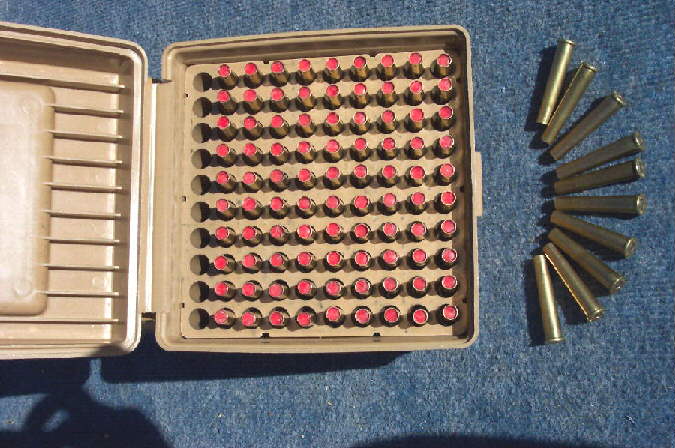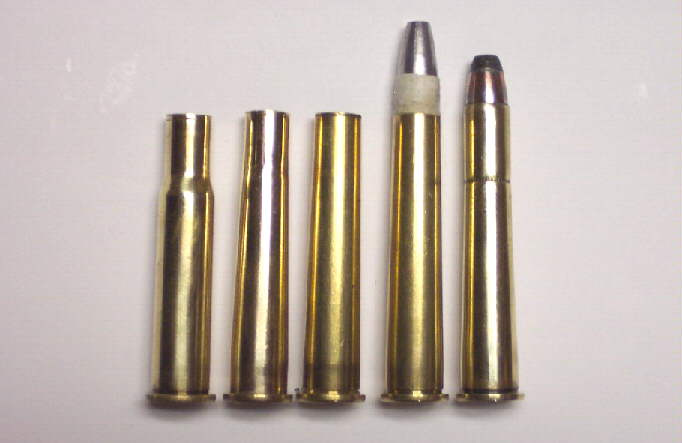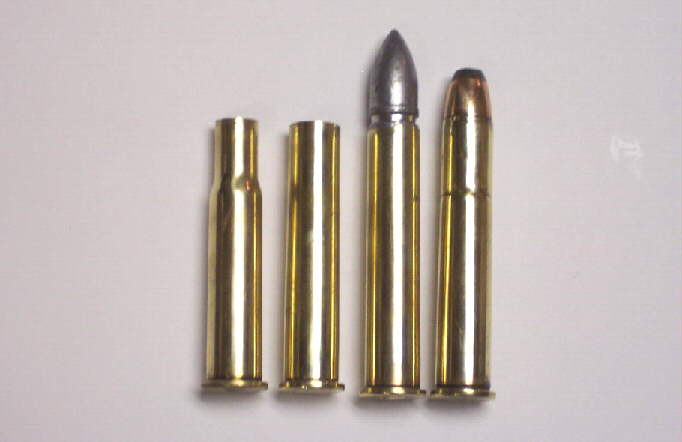
Fire Forming Cartridges by
Old Scout
My current “Major” project is the construction
of a 32-40 barrel for a H&R Handi-Rifle. This long gun is to be the
ultimate “Plainsman Category” rifle, for use in sidematch as well as main
match Plainsman events.
The CAS style of shooting often leads to
lost brass or trampled brass, that is useless for reloading. The 32-40
brass is a bit expensive and hard to find, so to combat that problem, this
project rifle will use 30-30 brass formed to 32-40. The ubiquitous 30-30
hull can be found at gun shows and club swap meets for $5 to $10 a hundred,
and even new it is probably the cheapest rifle brass there is. Loosing
a few of those at a shoot is no concern to me.
While preparing to fire form some 30-30 case,
it occurred to me that some folks may not be aware of this process. Cartridges
have quite often been introduced in families which use the same basic cartridge,
just formed to different shapes. One such family is the 22HP, 25-35, 30-30,
32-40, and 38-55. All of those calibers are based on the 38-55 basic cartridge.
Over the years the 32-40 and 38-55 brass
has, at times, been out of production. Those of us shooting these
guns had to resort to making our brass from 30-30 cases. The 32-40 case
may be formed by just re-sizing a 38-55 case in a 32-40 die. This makes
a great 32-40 case, but the 38-55 brass is just as hard to find as 32-40
and nearly as costly.
To use the 30-30 case, it is necessary to
first size it in a 32-40 die to reduce the shoulder diameter. While it
is possible to form the 32-40 completely in one operation, I prefer to
remove the expander from the sizing die, and just reduce the case diameter

(click for larger image) |
to fit the rifle. Then, fire forming in a rifle, produces
cases that are more uniform and slightly longer. If one is making 38-55
brass, fire forming the 30-30 case, is the only practical method.

Figure 1 (click
for larger image) |
The five cartridges shown in figure 1, are
left to right a 30-30 case, a resized 30-30 ready to fire form ( this case
still has a 30 caliber neck and slight shoulder), the case after firing,
and the re-formed cartridge loaded for use in a single shot rifle. The
last cartridge on the right is a factory 32-40 round. As can be seen the
re-formed 30-30 case is about .080” shorter than the factory round. The
slightly short case is not significant in a single shot rifle. When used
in a lever action rifle, it may be necessary to seat the bullet out of
the case, as required to get a workable over all length. Figure 2
shows the same process applied to produce the 38-55 cartridge.

Figure 2 (click
for larger image) |
For cartridges of this general capacity,
I load 10 to 12 grains of fast burning pistol powder ( I use Bullseye )
in the case and then fill the remaining space with cream of wheat type
cereal (currently I’m using Grits). Fill the case and then press
the filler down with a pencil or similar item and refill. For handling
purposes I then press a thin wax wad over the case mouth. Others use a
couple of drops of “White Glue” to keep the filler in place. When fired
these forming loads are dangerous to about 15 feet, and make a fair amount
of noise. They should be treated just as live ammo would be. Smaller volume
cases would use much smaller charges.
An occasional “hard” case will split at the
neck when fire formed. This is not a dangerous matter, and will only be
encountered with used brass. Out of 100 pieces of used brass I expect to
loose 5 during forming and maybe another 5 in the first loading, to neck
cracks.
I form many 100’s of cases each year for
the “Odd Ball” guns I enjoy shooting, such as 40-85 ( from 9.3x74R), 8x50R
(from 7.62x54R), and 38-50 Rem. (from 30-40 Krag).
Old Scout
|